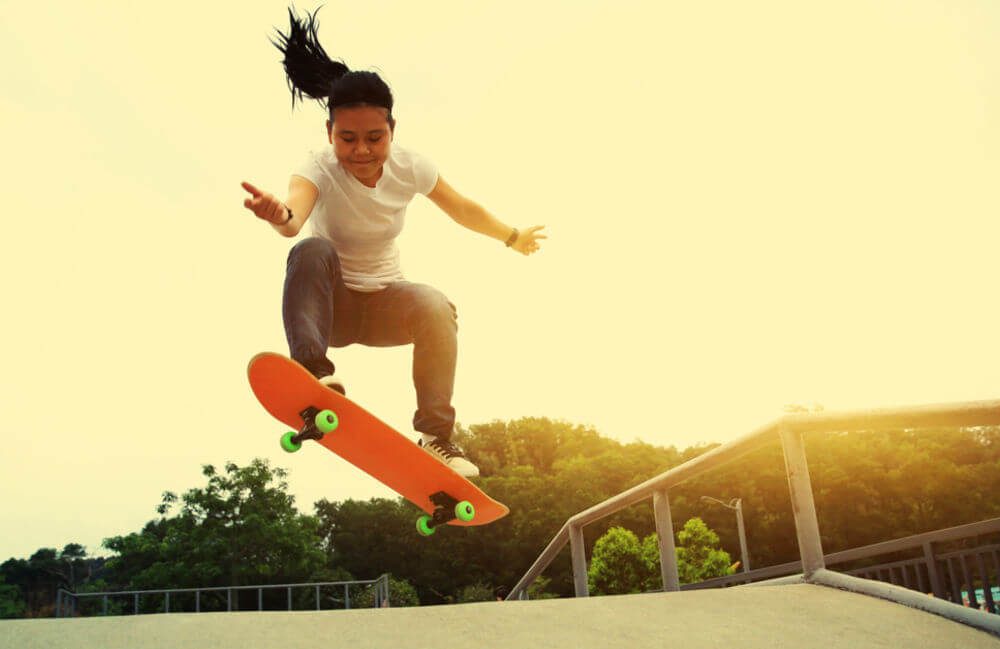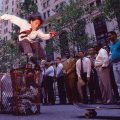Skateboarding, like many sports, has many incredible benefits for people of all ages. This article will look specifically at different benefits for children, how learning difficulty children can learn, how skateboarding can benefit a shy child, and even if your child can get a scholarship to college for skateboarding.
While parents might think the sport is not safe, we will explain how it can be safe, fun, and beneficial for your child. Providing a safe environment to learn and develop the skills needed for skateboarding, GOSKATE can get your child up and skating in no time!
Let’s get into the nitty gritty of what parents really want to know about the sport of skateboarding and how it can benefit their children!
What are some key skateboarding benefits for children?
Skateboarding has a wide range of benefits for children of pretty much all ages. It is not simply a scary and dangerous sport that is shown on TV, it is a safe, enjoyable, and beneficial sport, if taught properly and safely.
Here are some of the most important benefits for children.
- Physical activity. Skateboarding provides an excellent form of exercise for children (and adults!). It can help develop strength, balance, coordination, and cardiovascular fitness.
- Improved mental health. The sport can also have a positive impact on mental health. It can help to reduce stress and anxiety, improve mood, and boost self-esteem and confidence.
- Creative expression. Skateboarding allows children to express themselves creatively. They can explore different styles, techniques, and develop their own unique approach to the sport.
- Socialization. It is often a social activity, with many children enjoying skateboarding with friends and family. This can help to develop social skills and promote teamwork.
- Risk-taking and problem solving. Like most sports, skateboarding involves taking risks and overcoming challenges and failures to learn and improve, also teaching children problem-solving skills and resilience.
- Respect for rules and safety. A sport such as skateboarding teaches children to respect rules, boundaries, and safety guidelines. They learn the importance of wearing protective gear and following safety procedures, to avoid injuring themselves and others.
Overall, skateboarding can be a fun and rewarding activity for children, providing them with a range of physical, mental, and social benefits. Learning a new sport gives a different activity for children to put their focus and concentration into as well.
My child is so shy, is skating a proper activity for them?
Skateboarding can be a great activity for shy children, as it can provide them with a sense of accomplishment and confidence as they develop new skills and overcome challenges. Skateboarding can also be a social activity, allowing shy children to interact with others who share their interest in the sport.

Skateboarding can be a great activity for shy children, as it can provide them with a sense of accomplishment and confidence as they develop new skills and overcome challenges. Skateboarding can also be a social activity, allowing shy children to interact with others who share their interest in the sport.
However, it is important to consider your child’s individual personality and preferences when determining if skateboarding is a good fit for them. If your child is extremely shy or has social anxiety, they may find it difficult to participate in group activities, even if they enjoy skateboarding. In this case, you may want to consider starting with solo skateboarding sessions or working with a one-on-one instructor to build their confidence before introducing them to group skateboarding.
Our GOSKATE instructors can help build confidence of your child, they will teach the basics at a level and rate that suits your child. They can have individual lessons or group sessions, depending on what they prefer.
It is also important to ensure that your child has the appropriate safety equipment and supervision while skateboarding, as this can help them feel more secure and comfortable as they learn new skills. Finally, remember that it is okay if your child decides that skateboarding is not for them – there are many other activities and hobbies that can help them build confidence and social skills.
My child has autism/learning difficulties, can they still learn to skateboard?
Yes, autistic children and children with learning difficulties can learn to skateboard. In fact, skateboarding can be a great activity for autistic children and children with learning difficulties, as it provides them with a range of sensory experiences and opportunities for physical activity and social interaction.
However, it is important to note that every child with autism is unique and may have different strengths, challenges, and sensory sensitivities. Some autistic children may be drawn to skateboarding and excel at it, while others may find it overwhelming or difficult to manage.
When teaching a child with learning difficulties how to skateboard, it is important to use an approach that is tailored to their individual needs and abilities. This may involve breaking down the skills and movements involved in skateboarding into smaller, more manageable steps, and providing additional support and guidance as needed.

It may be helpful to work with a specialized skateboarding instructor who has experience working with children with learning difficulties or autism. An instructor can provide individualized instruction and support, as well as adaptations and modifications to help the child learn and progress at their own pace.
Make sure to discuss with your GOSKATE instructor prior to any lessons around how your child is that day, what their coping mechanisms are, triggers, or different techniques of learning that work well with them.
With the right support and accommodations, many children with learning difficulties or autism can enjoy the physical, mental, and social benefits of skateboarding.
My child has special needs, can they learn how to skateboard?
Yes, it is possible for special needs children to learn how to skateboard. Skateboarding can provide many physical and sensory benefits, such as improving balance, coordination, and motor skills. However, it is important to work with your child’s healthcare provider or therapist to determine if skateboarding is appropriate for their individual needs and abilities.
Make sure to talk openly with your GOSKATE instructor about limits and boundaries within the disability or special needs your child has. Provided your instructor knows, they can adapt to the needs of your child, if they are not made aware of limitations, they will not necessarily know, and this could be harmful to all involved. For the safety of your child and the instructor, be fully open and honest.
Depending on your child’s condition, it may be necessary to make adaptations or modifications to the skateboard, or the way they learn to ride it. For example, some children with mobility or balance issues may require additional support, such as using a balance board or having someone assist them while riding. Additionally, it may be helpful to work with a specialized skateboarding instructor who has experience working with special needs children.
With the right support and accommodations, many special needs children can enjoy the physical, mental, and social benefits of skateboarding.
School takes up most of my child’s free time, do they still have time to skateboard?
It is important for children to prioritize their schoolwork and academic responsibilities, but it is also important for them to engage in physical activity and hobbies that they enjoy, such as skateboarding. The key is to find a balance between schoolwork and other activities.
One approach is to set aside specific times during the week for skateboarding, such as after school or on weekends, while also ensuring that there is enough time for studying and completing homework. It may also be helpful to involve your child in creating a schedule or routine that works for them.
It is important to remember that physical activity, such as skateboarding, can actually help to improve focus and concentration, which can in turn benefit their academic performance. Encouraging your child to engage in regular physical activity can also help promote overall health and well-being.
In addition, skateboarding can provide a break from the stresses of school and a way to decompress and recharge. It can also help children to develop important life skills, such as goal setting, persistence, and problem-solving.
Overall, while school work should be a priority, it is important to find a balance that allows your child to engage in physical activity and hobbies that they enjoy, such as skateboarding.
Can you get a skateboarding scholarship to college?
Yes, it is possible to receive a skateboarding scholarship to college. However, these types of scholarships are less common than scholarships for traditional sports such as football, basketball, and soccer.

Some colleges and universities offer skateboarding scholarships to talented skateboarders who demonstrate exceptional skill and dedication to the sport. These scholarships may cover tuition, fees, and other expenses, and may be awarded based on a combination of athletic performance, academic achievement, and other factors.
In addition, there are several organizations and foundations that offer skateboarding scholarships and other forms of support for young athletes. These organizations may provide financial assistance, mentorship, and other resources to help skateboarders achieve their goals and pursue their academic and professional aspirations.
It is important to note that the competition for skateboarding scholarships can be intense, and it may take significant dedication and hard work to be considered for this type of funding. However, for students who are passionate about skateboarding and committed to pursuing a college education, a skateboarding scholarship can provide valuable support and recognition.
Where and how should my kid learn how to skate?
Learning to skate can be a fun and exciting experience for children, but it’s important to ensure that they have access to a safe and supportive learning environment. Here are some tips for where and how your kid can learn how to skate:
- Choose a suitable location: Look for a skate park, rink or skating facility that is specifically designed for beginners, such as a smaller rink with fewer people. If there is not a designated area, find a flat, smooth and level surface where your child can practice. A grassy surface can be ideal, as it can provide some cushioning in case of falls.
- Get the right protective gear: Make sure your child has appropriate skates, as well as a helmet, elbow pads and knee pads, wrist guards, and gloves or mittens. Properly fitting equipment can help prevent injuries and make the learning process more comfortable.
- Consider taking lessons: Enrolling your child in a skating class or program can be a great way to ensure that they receive expert instruction and guidance. Many skating facilities offer group lessons for beginners, and private lessons are also available. GOSKATE have great session plans, for individuals or groups, and will even come to your house to help your child learn!
- Practice regularly: Encourage your child to practice regularly, but keep it fun and relaxed. Allow them to take breaks when needed and avoid putting too much pressure on them to progress too quickly.
- Provide support and encouragement: Skating can be challenging for any young person, and your child may experience falls or frustration along the way. It’s important to offer support and encouragement, and to celebrate their successes no matter how small.
Remember that learning to skate takes time and patience, so be sure to focus on the journey and the fun of the experience, rather than just the end result. The skateboarding community are a great collection of people, if you ever have any questions, any one of them will be happy to help!
Is skateboarding just for boys?

Not even slightly. Kids of all ages, all genders, and abilities can learn how to be a skateboarder. The skateboarding culture is very inclusive and welcoming, regardless of who you are or what you look like.
Although it may have been traditionally associated with male skateboarders, the sport has become increasingly diverse and inclusive in recent years.
There are many female skateboarders who are breaking down gender barriers and challenging stereotypes within the skate culture, and there are also skateboarding organizations and events that specifically cater to girls and women.
It’s important to encourage and support everyone who wants to try skateboarding, regardless of their gender, and to create a welcoming and inclusive environment for all skateboarders.
How do I help my child after a skateboarding injury?
While skateboarding can be seen as a dangerous sport, learning properly will make it as safe as possible. However, if your child sustains an injury while skateboarding, here are some steps you can take to help them recover:
- Firstly, get medical attention: Depending on the severity of the injury, your child may need medical attention from a doctor or other healthcare provider. Seek medical attention right away if the injury is severe or if you are unsure of the extent of it.
- Follow the doctor’s instructions: If your child has been treated by a doctor, be sure to follow their instructions carefully. This may include taking medication, keeping the affected area elevated, or avoiding certain activities while they heal.
- Encourage rest: It’s important for your child to rest and allow their body to heal after an injury. Encourage them to take it easy and avoid strenuous activities for a period of time.
- Provide emotional support: Being injured can be a scary and frustrating experience for children. Provide emotional support and reassurance to help your child cope with any fears or anxieties they may have about skateboarding or getting hurt again.
- Help them get back to skateboarding: If your child wants to get back into skateboarding after an injury, help them do so safely. Remind them that skateboarding, despite its risks, is a safe place and enjoyable place to be. Encourage them to wear protective gear, start slowly, and gradually work their way back up to their previous level of activity. Have patience with them, as it might take a while for them to feel confident again after the experience.
Remember that skateboarding, like any physical activity, involves some degree of risk. It’s important to take appropriate safety precautions, but accidents can still happen. If your child does get injured, stay calm, seek medical attention if necessary, and provide the support and care they need to recover.
It is possible that younger skaters will take more of a risk, due to know having the knowledge or experience of what an accident can be like. Make sure they stay within their skill level to avoid bad skateboarding injuries.
Summary
Skateboarding is such an incredible sport for children, of all abilities, ages, and gender. From being able to learn and conquer a new trick, to learning new social skills within the skateboarding community, increasing their coordination, a beginner skater can walk away from the skate park happy every session.
The physical benefits and cognitive function benefits are great for your child as they grow up. Being able to expand their physical activity to a new sport, such as skateboarding, brings not only joy and excitement, but develops their strength, coordination, and cardiovascular fitness.
If you are still unsure about skateboarding for your child, have a look at our Ultimate Beginners Guide to Skateboarding for more information about the sport!
Our GOSKATE instructors will help build confidence, knowledge, skills and create a skateboarding program with your child that suits their lifestyle and other interests.
Wherever you are, our instructors are able to travel to where suits you and your children best, the local park, your house, a skatepark, the opportunities are endless! If you are interested in getting started today, get talking to us and start your skateboarding journey!














